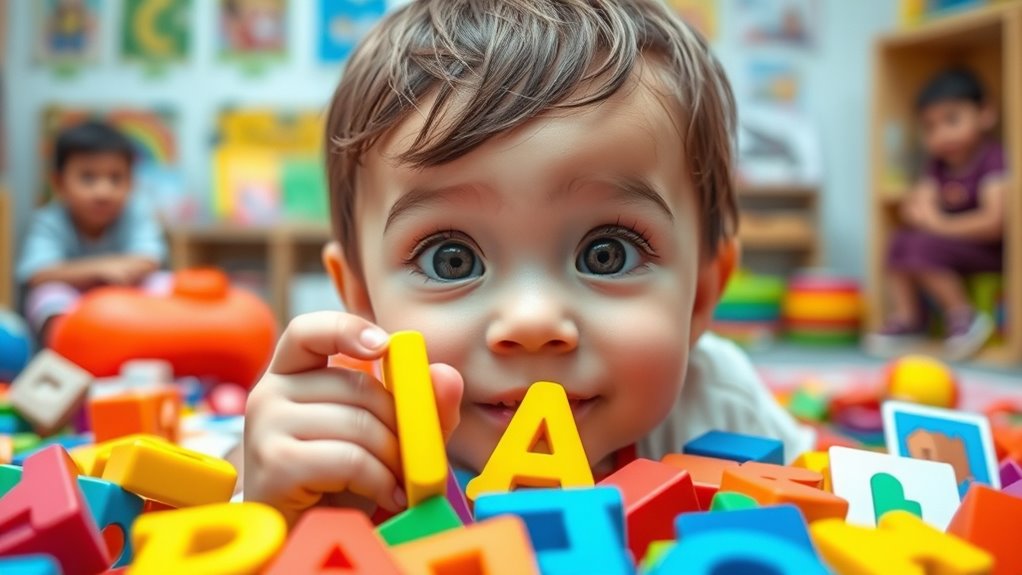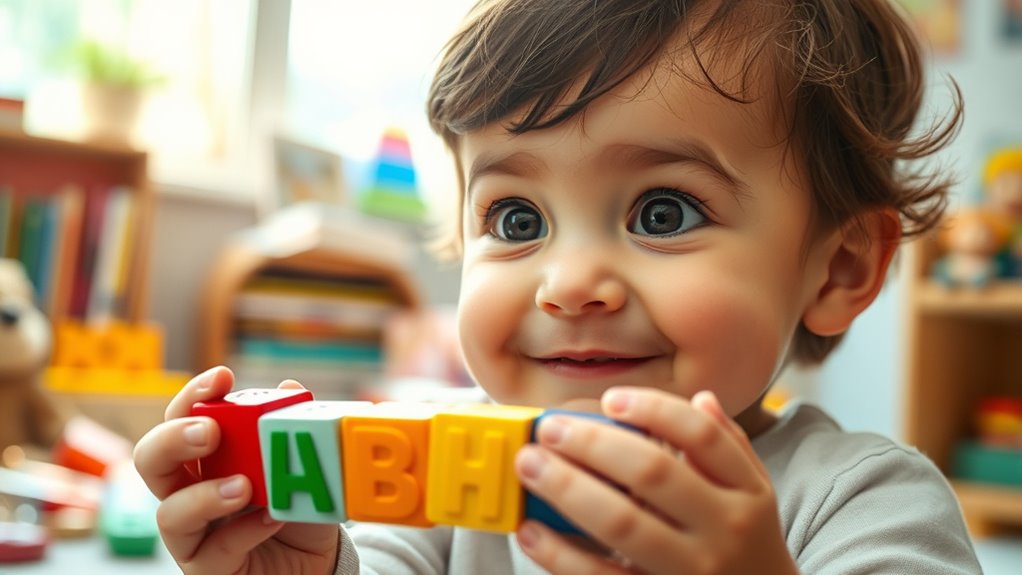When your toddler learns new words during their language explosion, their brain actively rewires itself by forming stronger neural connections and firing synapses more rapidly. This process creates a complex network that supports language, thinking, and problem-solving skills. As they mimic, practice, and gain exposure through books and conversations, their brain becomes more efficient and adaptable. Keep exploring this fascinating journey—there’s so much more happening behind their growing vocabulary.
Key Takeaways
- During a language explosion, toddlers’ brains rapidly develop new neural connections, expanding vocabulary and cognitive abilities.
- Synapses fire more quickly and form stronger links, supporting complex thinking and language comprehension.
- Imitation and repetition reinforce neural pathways involved in speech production and understanding.
- Exposure to rich language environments enhances brain flexibility, problem-solving, and information organization.
- This growth lays the foundation for literacy, academic success, and advanced cognitive skills later in life.

Have you ever wondered how the world’s languages have rapidly expanded and diversified over recent decades? It’s fascinating to think about, especially when you consider what’s happening inside your toddler’s brain as they learn new words. During this pivotal period of language explosion, their brain development accelerates in ways that shape not only their vocabulary but also their overall cognitive abilities. When your child encounters a new word, their brain doesn’t just store it as a simple label; it actively processes and connects it to existing knowledge, creating a network of understanding. This process fuels vocabulary growth, which is vital for effective communication and social interaction.
Inside your toddler’s brain, new words create a dynamic network that fuels growth and understanding.
As your toddler absorbs new words, their brain’s neural pathways become more intricate and efficient. Synapses—the connections between neurons—fire more rapidly and form stronger links, supporting more complex thought processes. This heightened activity is a sign of brain development at its peak, as your child begins to grasp abstract concepts, categorize objects, and understand relationships between ideas. Each new word you hear your child say is evidence of this rapid neural wiring, which lays the foundation for literacy and academic success later on.
You might notice that during this phase, your child’s ability to imitate words and phrases improves dramatically. That’s because their brain is actively reinforcing language patterns through repetition and practice. As they say words aloud, their brain strengthens the connections involved in speech production and comprehension. This active engagement is vital for vocabulary growth, as it helps your child retain what they’ve learned and effortlessly incorporate new words into their everyday conversations.
Moreover, the variety of words your toddler encounters influences not just their vocabulary size but also how their brain organizes and prioritizes information. When exposed to a rich language environment—books, conversations, songs—they develop a broader lexicon and better cognitive flexibility. This flexibility enables them to think creatively, solve problems, and adapt to new situations. Essentially, each new word learned during this explosion enhances their brain development on multiple levels, making their thinking sharper and more adaptable. Neural pathways become more complex, supporting their overall cognitive growth and future learning capabilities.
Frequently Asked Questions
How Can I Tell if My Toddler’s Language Skills Are Developing Normally?
To tell if your toddler’s language skills are developing normally, look for key milestones like saying simple words by age one and combining words by age two. Regular speech assessments with a pediatrician can help track progress. If your child isn’t meeting these milestones or has difficulty understanding or using words, consider consulting a speech therapist. Consistent engagement and positive reinforcement support healthy language development.
What Activities Best Support My Toddler’S Language Growth?
You can support your toddler’s language growth by engaging in activities like reading aloud and singing songs. These activities expose them to new words and sounds, helping them learn vocabulary naturally. As you read or sing together, encourage their participation by asking simple questions or pausing for their responses. Consistent interaction like this strengthens their understanding and confidence, making language development both fun and effective.
When Should I Be Concerned About Speech Delays?
You should be concerned about speech delays if your toddler isn’t meeting key language milestones by age two, such as using two-word phrases or pointing to familiar objects. If you’re worried, consider consulting a speech therapist who can evaluate your child’s development and recommend early intervention if needed. Addressing delays early gives your child the best chance to improve communication skills and supports their overall growth.
How Do Bilingual Environments Affect Language Development?
In bilingual environments, you might notice your toddler engaging in code switching, which is normal and shows their growing language skills. Cultural influences shape how they learn and use words, enriching their communication. Instead of worrying, support their language development by encouraging both languages and understanding that mixing them is part of their learning process. This flexibility helps your child become confident bilingual speakers, embracing their cultural identity through language.
What Are Some Signs of Advanced Language Skills in Toddlers?
Imagine your toddler confidently naming objects and forming complete sentences—these are signs of advanced language skills. You’ll notice they hit vocabulary milestones early, using a wide range of words, and their expressive language is rich and detailed. For example, a child describing their day with complex sentences shows impressive language development. Keep an eye out for this progress, as it indicates strong communication skills and early mastery of language.
Conclusion
As your toddler’s brain rapidly absorbs new words, it’s exciting to see their language skills flourish. Did you know that between ages 1 and 2, kids typically learn about 50 to 100 words a month? This “language explosion” isn’t just adorable—it’s their brain’s way of building vital connections. Keep talking, reading, and engaging with them. Your active involvement fuels their vocabulary growth and helps shape a confident communicator for years to come.









